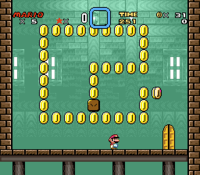Control Coin
- Not to be confused with Control Block.
Control Coins[1] are types of moving coins in Super Mario World and Super Mario World: Super Mario Advance 2. They are usually released from certain ? Blocks called Control Blocks[2], and they move in the direction the player presses on the + Control Pad. They are found in Donut Ghost House, Donut Secret 2, Valley Ghost House, and Star World 5. Control Coins also appear in the World-e levels Doors o' Plenty and Vexing Doors from Super Mario Advance 4: Super Mario Bros. 3, where they serve the same purpose.
If Mario or Luigi hits a Switch Block, the coins become solid blocks, similar to snake platforms, which Mario or Luigi can ride while still controlling the blocks. However, if the Control Coin touches a wall or obstacle, it will stop moving and can no longer be controlled. The chain will also stop if Yoshi eats the leading coin, which will cause the switch's background music to play indefinitely. Control Coins also have a finite number of coins, after which it will stop, but not in Super Mario World.
In Super Mario RPG: Legend of the Seven Stars, a similar coin appears in one of the rooms of the Sunken Ship, but it moves independently on a predetermined path, leaving coins behind. If Mario can collect every single coin the Control Coin leaves behind, he will earn another one of King Calamari's clues. Similar coins also appear in Super Mario 3D Land, though they only applaud the player for collecting them all.
Media
| File info |
Names in other languages
| Language | Name | Meaning | Notes |
|---|---|---|---|
| Japanese | コントロールできるコイン[3] Kontorōrudekiru Koin コントロールコイン[4] Kontorōru Koin |
Controllable Coin Control Coin |
|
| Italian | Monete direzionali[5] | Directional coins |
References
- ^ M. Arakawa. Nintendo Mario Mania Player's Guide. Pages 68, 69, 72.
- ^ M. Arakawa. Nintendo Mario Mania Player's Guide. Page 155.
- ^ Super Mario World Shogakukan Book 1 (pg. 34)
- ^ Shogakukan. 2015. Super Mario Bros. Hyakka: Nintendo Kōshiki Guidebook, Super Mario World section, page 60.
- ^ Super Mario Bros. Enciclopedia booklet; pag. 60
